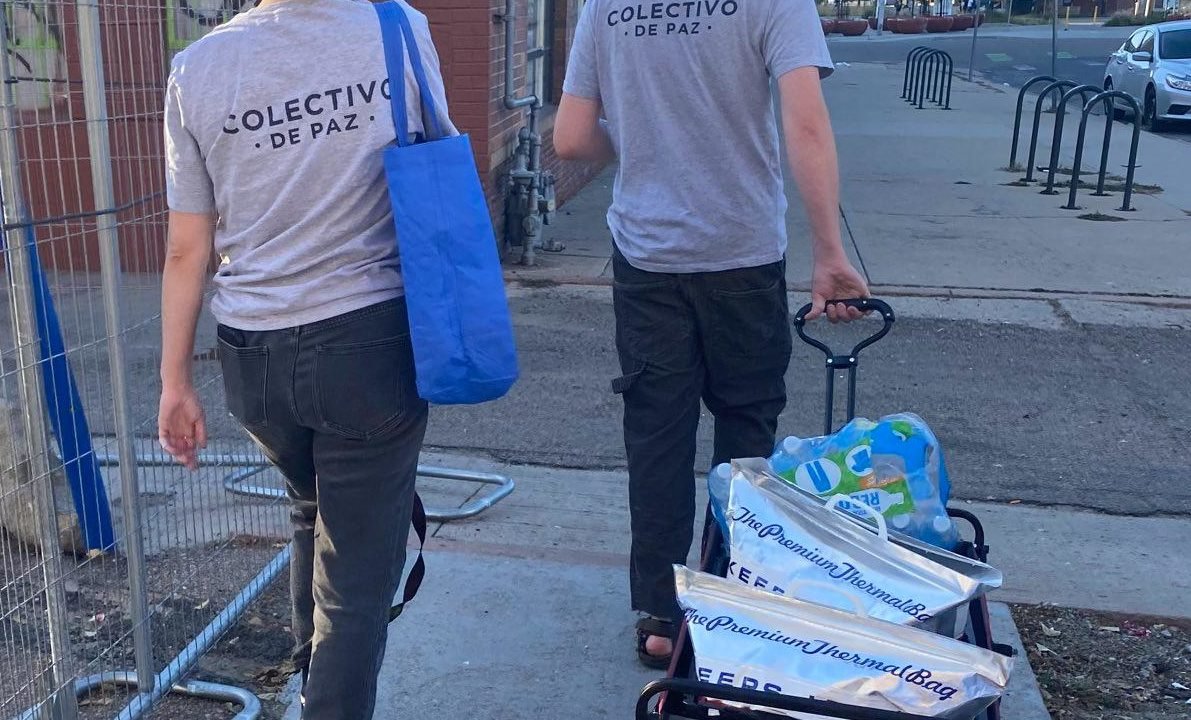Denver nonprofit builds bonds of trust one food package at a time
Colectivo de Paz makes food a bridge.
The Denver nonprofit’s mutual aid program focuses on supporting people living unhoused. And a major way it builds trust between the organization’s volunteers and staff and the individuals they serve is by demonstrating an understanding of basic needs.
“If you don’t have those basic physical needs met, there isn’t anywhere else to go. Food is always a need, and it creates trust,” said Julian Temianka, the group’s Director of Outreach and Advancement. “With that line of communication open we can do more. Maybe it’s naturalization status. Maybe it is a wound that’s just out of sight under their shirtsleeve. We can’t just come in to say, ‘Who needs legal services?’ until we establish that baseline.”
For Colectivo de Paz, the baseline is allowing the community they serve to define their own needs and then harnessing other community members to meet those needs. It is the way the group’s leadership got started and they have simply expanded their model to encompass a more formal structure with a small staff and a growing cadre of volunteers.
“We are a responsive organization. We respond directly to the material needs our community has. And we are driven by the line that our community provides,” said Hridith Sudev, founder and President of the nonprofit. “When we started, we were disparate community members who filled gaps for others. Now we are a tangible network that lets all those disparate acts of altruism coalesce into something bigger -- something systemic and sustainable. We’re always expanding to support other community members who want to partner with us.”
Sudev explained that the organization is built on the Sankara Method of organizing, which focuses on empowering communities to be self-reliant through seven pillars of targeted work -- education, economic support, legal support, civic advocacy, social development, healthcare access, and mutual aid. Over the last year, the group’s mutual aid efforts for people living unhoused have provided more than 6,500 hot meals as well as direct aid kits that include non-perishable food, personal hygiene products, NARCAN, and other needed medications.
Photo from Colectivo de Paz’s website
In food access, the group’s work has expanded from providing what was available through general, but somewhat random charity, to a consistent supply of hot meals. They have gained access to commercial kitchens where donated food can be prepared, and have established foundational pipelines of quality food being donated from restaurants and grocery stores rather than their excess food being thrown away.
Recently, the group’s focus on meeting basic, community-defined needs brought a tangible victory for a young mother and son from Colombia. The mother, Elena, was living unhoused and without proper documentation following failed attempts to navigate the immigration process on her own. Her son had found shelter away from her at Urban Peak.
Once Elena connected with Ariana Cuevas, who works as the group’s Media and Marketing Manager, things took a turn for the better. Cuevas and Sudev were able first to meet Elena’s basic needs as well as help her find quality, stable housing that could include her son. Then Cuevas set to work connecting Elena with legal support who could help her make a good case for asylum and put her on the road to gaining proper documentation. They were also able to fly her partner, who had been stuck in Texas, to Denver so that the family could be together.
“She came to us this weekend with her partner and son to cook and distribute food. She is already here volunteering,” Cuevas said. “She said her energy has returned 1,000-fold. She was so happy to see the people she was living with on the streets and that she could make a difference for them.”
Just a year and a half ago, the small group of volunteers was delivering between 20 and 30 meals a week. Today, that number surpasses 100. Their partnerships include food banks and local restaurants.
They have expanded their supply of medication available for their street medicine service and have more than tripled their number of volunteers. They have also diversified beyond mutual aid, providing educational classes for high school students, connecting newly arrived refugees with education and employment opportunities, and setting up food pantries in communities with need.
“None of this would be possible without the community members who want to see the results,” Sudev said. “We learned early on that we had to bite off more than we could chew. And then chew it.”



